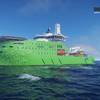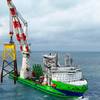As glacier melt in the Arctic continues to accelerate, the foot of the Atlantic's most powerful ocean current keeps pressing harder and harder on the brake pedal, resulting in the weakest Gulf Stream in the last 1,000 years.
The slowing Gulf Stream water currents is threatening shifts in U.S. and European weather, as well as coastal sea levels including in New York and Boston.
The cooling above the Northern Atlantic would only slightly reduce the continued warming of the continents. The scientists certainly do not expect a new ice age, thus the imagery of the ten-year-old Hollywood blockbuster ‘The Day After Tomorrow’ is far from reality. However, it is well established that a large, even gradual change in Atlantic Ocean circulation could have major negative effects.
"There is more than a 99 per cent probability that this slowdown is unique over the period we looked at since 900 AD," Stefan Rahmstorf, study author and researcher at Germany's Potsdam Institute for Climate Impact Research, told The Independent. "We conclude that the slowdown many have described is in fact already underway and it is outside of any natural variation."
The Atlantic overturning is one of Earth’s most important heat transport systems, pumping warm water northwards and cold water southwards. Also known as the Gulf Stream system, it is responsible for the mild climate in northwestern Europe.
A vast, powerful, and warm current, the Gulf Stream transports more water than “all the world’s rivers combined,” according to the National Oceanic and Atmospheric Administration.
Scientists now found evidence for a slowdown of the overturning – multiple lines of observation suggest that in recent decades, the current system has been weaker than ever before in the last century, or even in the last millennium.
The gradual but accelerating melting of the Greenland ice-sheet, caused by man-made global warming, is a possible major contributor to the slowdown. Further weakening could impact marine ecosystems and sea level as well as weather systems in the US and Europe.
Jason Box, a researcher with the Geological Survey of Denmark and Greenland. "So the human-caused mass loss of the Greenland ice sheet appears to be slowing down the Atlantic overturning, and this effect might increase if temperatures are allowed to rise further."













